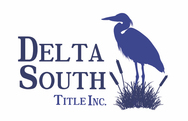
Your Best Decision is
in Our Hands!
Blog
12/17/2024
Knowing certain escrow terms can empower you as a buyer or seller to be better informed and make smarter decisions in your real estate venture. Learn a basic glossary in this post that Delta South Title, Inc. in Mobile, AL has for you.
When going through the escrow process in real estate, buyers and sellers encounter a variety of terms that can seem confusing. Understanding these key terms can help both parties navigate escrow more confidently, avoid misunderstandings, and contribute to a smoother transaction. Here are some essential escrow terms every buyer and seller should know.
Don’t go into a complex real estate transaction unprotected! Call Delta South Title, Inc. in Mobile, AL at (251) 633-3133 to get the assistance and title services your case requires.
Basic Escrow Terms You Should Know
1. Escrow Account
An escrow account refers to a third-party account that holds funds or documents until all conditions of a transaction are met. During a real estate sale, the buyer’s deposit (earnest money) and other funds are placed into this account. The escrow account ensures that no party has control over the funds until both parties have fulfilled their contractual obligations, such as completing inspections or securing financing.
2. Earnest Money Deposit
The earnest money deposit is the buyer’s initial deposit to show they are serious about purchasing the property. It’s typically held in escrow and later applied toward the closing costs or down payment if the sale proceeds. If the buyer backs out without a valid reason, the seller may have the right to keep this deposit. However, if the sale doesn’t go through due to issues like financing or inspection problems, the buyer may get their earnest money back.
3. Contingency
A contingency is a condition that must be met for the sale to proceed. Common contingencies include financing, inspection, and appraisal contingencies. For instance, a financing contingency allows the buyer to back out if they can’t secure a mortgage. An inspection contingency gives the buyer the right to request repairs or cancel the sale based on the inspection results. All contingencies must be satisfied or waived before escrow can close.
4. Title Search
A title search is an examination of public records to confirm the property’s legal ownership and check for liens, encumbrances, or claims. This ensures that the seller has the right to transfer the property to the buyer without any unresolved debts or disputes. If issues are found, the seller typically needs to resolve them before the sale can proceed. Title insurance, which protects against unforeseen title issues, is usually purchased based on this search.
Are you in need of professional title services? Call Delta South Title, Inc. in Mobile, AL at (251) 633-3133 to complete your real estate transaction confidently and safely.
5. Closing Costs
Closing costs are the fees and expenses associated with finalizing the real estate transaction, often totaling 2-5% of the property’s sale price. They include fees for the escrow service, title insurance, appraisal, inspections, and sometimes mortgage points. Buyers and sellers should review closing costs with their escrow agents and real estate agents to know what to expect and who is responsible for each cost, as they may vary by region.
6. Settlement Statement (or Closing Statement)
A settlement statement is a detailed document outlining the final financial terms of the transaction. It lists all fees, credits, and costs for both the buyer and seller, including the sale price, closing costs, escrow fees, and prorated taxes. This document is crucial in understanding the exact amount each party will pay or receive at closing. Reviewing the settlement statement carefully ensures both parties know the final amounts involved.
7. Escrow Agent
Another key escrow term is escrow agent. It refers to a neutral third party who manages the escrow account, oversees the transaction, and makes sure that all contractual terms are met. The agent facilitates communication, verifies documentation, and disburses funds once both parties meet all conditions. Escrow agents play a central role in ensuring a secure and organized transaction.
8. Closing Date
The closing date is the final date when all escrow conditions are met, and ownership transfers from the seller to the buyer. On this day, the escrow agent disburses funds to the seller, and the buyer receives the deed. Both parties should be prepared for this date by having all necessary documentation and payments in order.
Keep your real estate investment protected with a title search and title insurance. Call Delta South Title, Inc. in Mobile, AL at (251) 633-3133 for all of your title services needs.
COPYRIGHT © 2024 Delta South Title, Inc.
ALL RIGHTS RESERVED

